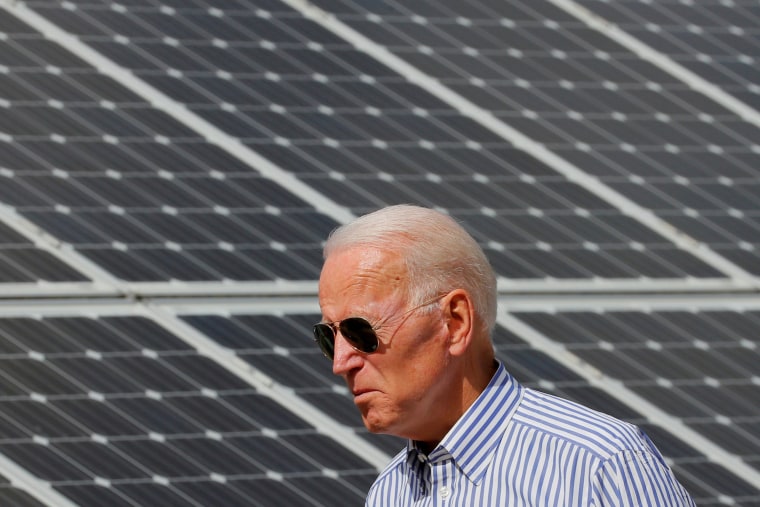WASHINGTON — Solar power could provide nearly half of America's electricity by the middle of this century, the Biden administration said in a study released Wednesday as it tries to prove that its ambitious zero-emissions goal can be reached by then.
The study by the Energy Department's National Renewable Energy Laboratory found that meeting the administration's climate change goals would require increasing the solar share of energy production to at least 37 percent by 2035 and then to 44 percent or more by 2050. Just 3 percent of the current electricity supply comes from solar power.
The rest would come from other clean energy sources, with the Biden administration envisioning wind as the second-largest source and smaller contributions from nuclear power, hydropower and hydrogen gas.
President Joe Biden previously set a goal for U.S. electricity to be carbon-neutral by 2035 but had not spelled out what mix of clean energy sources would be needed to achieve it. The new study is the clearest sign to date that the administration plans to rely predominantly on solar power rather than on wind turbines to generate the bulk of new renewable energy.
"It's really a competition between wind and solar," said Fengqi You, an energy systems engineering professor at Cornell University. The vast majority of solar panels deployed in the U.S. are imported, predominantly from China, he said, adding, "If we ramp up this production, that will involve complicated geopolitical issues."
The Energy Department study found that hitting the administration's targets would require the U.S. to double its annual new solar deployment by 2025 and then quadruple it in the late 2020s.
Once cost-prohibitive on a large scale, solar power has plummeted in price over the last several years, so much so that building solar projects is often cheaper now than building plants for fossil fuels, like coal or natural gas. Energy Secretary Jennifer Granholm said the study illustrates how solar power is "our cheapest and fastest-growing source of clean energy."
"Achieving this bright future requires a massive and equitable deployment of renewable energy and strong decarbonization policies," such as those in the bipartisan infrastructure bill being debated in Congress, Granholm said.
Whether that legislation ultimately survives and how much of the climate-related funding sought by Biden remains intact is likely to determine how feasible his goals will be. The administration is under pressure to prove that its lofty goals to dramatically cut U.S. emissions of heat-trapping gases can actually be met ahead of a global climate summit in Scotland in November. Many other countries are skeptical about U.S. commitments, given the obstacles to climate legislation in Congress and the former Trump administration's withdrawal from the Paris climate accord, which Biden rejoined.
Recent extreme weather events in the U.S. have called further attention to serious weaknesses in the U.S. power grid and electricity generating infrastructure, including in California and Texas and in Louisiana, where hundreds of thousands of people remain without power more than a week after Hurricane Ida made landfall. In New Jersey, another state hit hard by the hurricane, Biden made the case for more infrastructure funding to address the climate problem as he toured hurricane damage Tuesday.
"We've got to listen to the scientists and economists and the national security experts. They all tell us this is code red. The nation and the world are in peril," Biden said. "That's not hyperbole. That is a fact."

